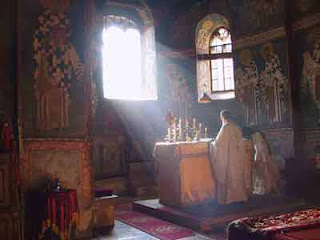"In the Old and in the New Testament the main difference between a temple and a house of worship is that the latter has no altar, which is the most important place in the temple. Dating as far back as Adam, it was pleasing to God to show His distinctive presence in the places where sacrifices were offered (cf. Gen 4:4). It was by the altar that He revealed Himself to Noah (Gen 8:20-21). He commanded that the tabernacle and the Temple of Solomon be built for offering sacrifices, and sanctified them through the manifestation of His uncreated glory in the form of a cloud (Exod. 40:34; 1 Kings 8:10). The Lord said of the Temple of Solomon: I have hallowed this house, which thou hast built, to put my name there for ever; and Mine eyes and Mine heart shall be there perpetually (1 Kings 9:3).
The Savior Himself prayed in the temple, calling it His Father's house (Jn. 2:16). Then in the New Testament Church, the holy apostles established the practice of erecting altars in churches. Here's what St. Paul says about this: We have an altar, whereof they have no right to eat which serve the tabernacle (Heb. 13:10). It's the same today – in the Apostolic Church the heart of a church is the altar. To this we may add that in heaven – which … is the pattern for our worship services – there is a mystical altar. St. John saw the souls of the martyrs beneath it (Rev. 6:9), and from this sacred place God reveals His will to the angels (Rev. 9:13; 16:7). The prophet Isaiah received purification from the heavenly altar: Then flew one of the seraphims unto me, having a live coal in his hand, which he had taken with the tongs from off the altar: And he laid it upon my mouth, and said, Lo, this hath touched thy lips; and thine iniquity is taken away, and thy sin purged (Is. 6:6-7). Yet it's precisely this all-important object that is missing in protestant houses of worship, and for this reason they cannot be called biblical churches."
Excerpted from the fabulous little book entitled "A Protestant's Walk Through an Orthodox Church," By Priest Daniel Sysoev. pp. 13-14

No comments:
Post a Comment